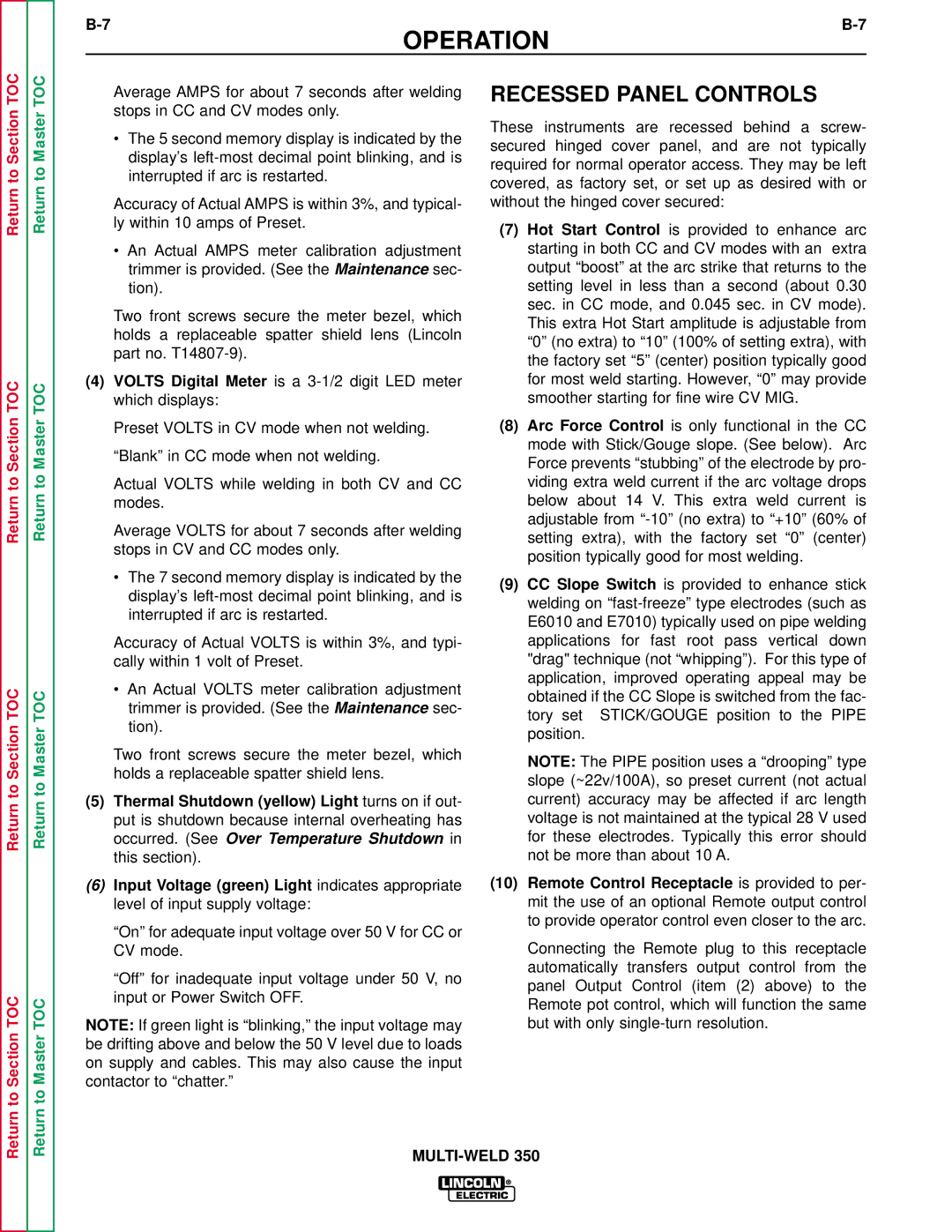
OPERATION
Return to Section TOC
Return to Section TOC
Return to Section TOC
Return to Section TOC
Return to Master TOC
Return to Master TOC
Return to Master TOC
Return to Master TOC
Average AMPS for about 7 seconds after welding stops in CC and CV modes only.
•The 5 second memory display is indicated by the display’s
Accuracy of Actual AMPS is within 3%, and typical- ly within 10 amps of Preset.
•An Actual AMPS meter calibration adjustment trimmer is provided. (See the Maintenance sec- tion).
Two front screws secure the meter bezel, which holds a replaceable spatter shield lens (Lincoln part no.
(4)VOLTS Digital Meter is a
Preset VOLTS in CV mode when not welding. “Blank” in CC mode when not welding.
Actual VOLTS while welding in both CV and CC modes.
Average VOLTS for about 7 seconds after welding stops in CV and CC modes only.
•The 7 second memory display is indicated by the display’s
Accuracy of Actual VOLTS is within 3%, and typi- cally within 1 volt of Preset.
•An Actual VOLTS meter calibration adjustment trimmer is provided. (See the Maintenance sec- tion).
Two front screws secure the meter bezel, which holds a replaceable spatter shield lens.
(5)Thermal Shutdown (yellow) Light turns on if out- put is shutdown because internal overheating has occurred. (See Over Temperature Shutdown in this section).
(6)Input Voltage (green) Light indicates appropriate level of input supply voltage:
“On” for adequate input voltage over 50 V for CC or CV mode.
“Off” for inadequate input voltage under 50 V, no input or Power Switch OFF.
NOTE: If green light is “blinking,” the input voltage may be drifting above and below the 50 V level due to loads on supply and cables. This may also cause the input contactor to “chatter.”
RECESSED PANEL CONTROLS
These instruments are recessed behind a screw- secured hinged cover panel, and are not typically required for normal operator access. They may be left covered, as factory set, or set up as desired with or without the hinged cover secured:
(7)Hot Start Control is provided to enhance arc starting in both CC and CV modes with an extra output “boost” at the arc strike that returns to the setting level in less than a second (about 0.30 sec. in CC mode, and 0.045 sec. in CV mode). This extra Hot Start amplitude is adjustable from “0” (no extra) to “10” (100% of setting extra), with the factory set “5” (center) position typically good for most weld starting. However, “0” may provide smoother starting for fine wire CV MIG.
(8)Arc Force Control is only functional in the CC mode with Stick/Gouge slope. (See below). Arc Force prevents “stubbing” of the electrode by pro- viding extra weld current if the arc voltage drops below about 14 V. This extra weld current is adjustable from
(9)CC Slope Switch is provided to enhance stick welding on
NOTE: The PIPE position uses a “drooping” type slope (~22v/100A), so preset current (not actual current) accuracy may be affected if arc length voltage is not maintained at the typical 28 V used for these electrodes. Typically this error should not be more than about 10 A.
(10)Remote Control Receptacle is provided to per- mit the use of an optional Remote output control to provide operator control even closer to the arc.
Connecting the Remote plug to this receptacle automatically transfers output control from the panel Output Control (item (2) above) to the Remote pot control, which will function the same but with only
